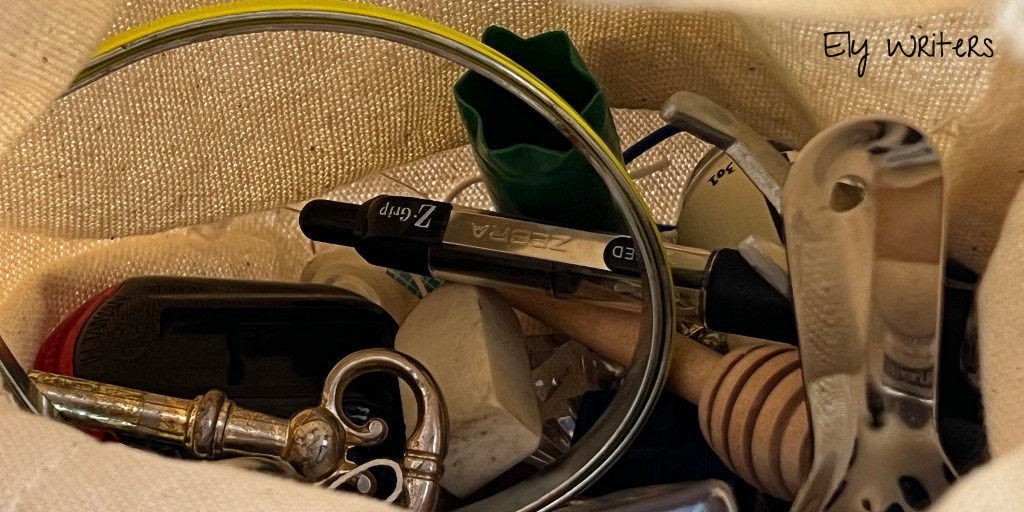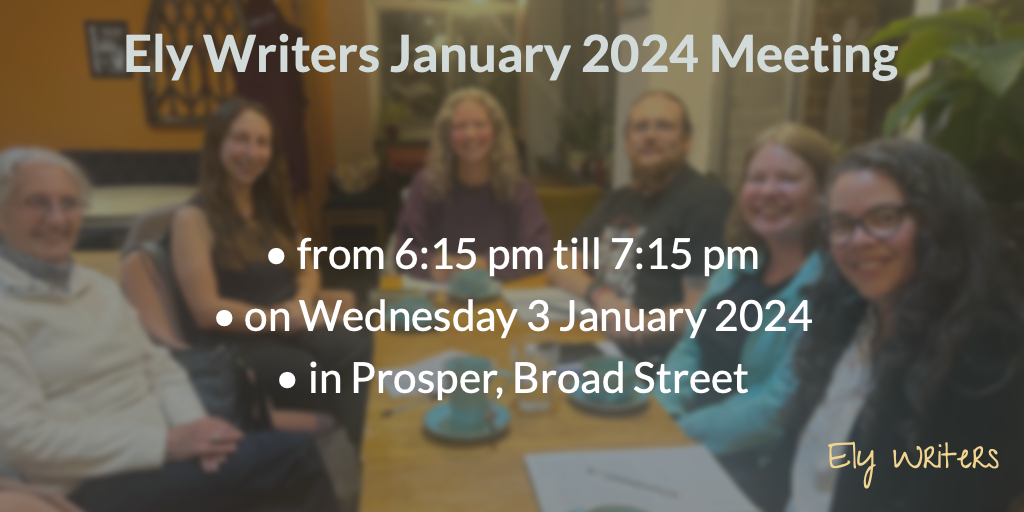A happy new year to you all!
This month, the first of 2024, saw familiar faces, new faces and brand new faces; seven of us in all. We were delighted that one familiar face had resolved to come back after missing a few meetings.
We kicked off at the earlier time of 6:15 PM, as discussed with Prosper. Everyone remembered to come earlier, with no one turning up just as we were leaving – phew!
Introductions and progress reports
Caity hasn’t done lot of writing since we last met, but she has been busy behind the scenes.
Our resident zombie apocalypse guy is getting on with the third novel in his series, along with a zombies versus Santa story!
Our academic creative writer is nearing the end of her course, and is writing up the last of her coursework. Good luck, and we’re excited to see what happens after graduation!
One of our brand new members has been writing on and off over the years, mostly memoir with a bit of poetry thrown in for good measure.
A returning new member is picking up a story she started during Covid. This is a longer piece than she usually writes.
Another returning new member hadn’t got much done because of one thing or another, but managed to write ~500 words before this meeting. That’s 500 words more than the day before!
Our other new member hasn’t written for a while, and what she has written has been non-fiction for work. She now wants to write fiction for fun, and is hoping we can help her with that. We’ll do our best – that’s one of our purposes, after all!
Our member who came back as a result of a new year’s resolution is going to start a beginners’ course on creative writing at the National Centre for Writing in Norwich (see Resources for more details). Inspired by Christmas ghost stories, she’s currently writing her first one ever, but isn’t finding it spooky enough. The Ely Writers came up with lots of suggestions of books to read for inspiration1,2,3,4.
Free writing
This month, we used the bag of goodies. Each person picked something from the bag and used that object as their inspiration to write something in five minutes and one second (for technical reasons).

Some of us read out what we’d written. It’s always fascinating to hear what people can write in five minutes from a simple prompt. Free writing is an excellent way to get past writer’s block and to put some text on that blank page. You can use it for writing a piece that’s unrelated to your current work or you can use it, like Caity often does, to develop existing characters and learn of their experiences.
Some Ely Writers used the object literally; for example, the compass. Others took the object and changed its use; for example, the red bike light became a runner’s light. Still others took their object and thought laterally; for example, the six-inch ruler became the ruler of a people. These are all valid ways to use the inspirational objects. The point of these objects is to set your imagination down whatever path is lit up from that object. The end result can be drivel or it can be great. It doesn’t matter: you’ve written something.
All of the pieces that were read out were great. They all had some lovely aspects, whether it was characterisation, twists or something that some of the other Ely Writers could identify with.
Ely Writers is brimming with writerly talent!
Readings
We had two readings this week; both authors asked for feedback; both readings were first draft. I went through the rules for readings for the benefit of our new before the readings were read.
The first reading was from near the start, and had some really good imagery and characterisation. Characterisation done well at the start of a longer story helps draw the reader in as they get to know the characters, especially the protagonist.
The second reading was really good as well, leaving the audience wanting to know what happened next. Suspense in a story helps keep the reader turning the page.
One of the readings brought out an important point in exposition: so-called maid-and-butler dialogue, where two characters tell each things they already know for the benefit of the reader (or viewer, if the writing is a play or screenplay). This is something we can look at another time.
Workshop: theme
This month, the Ely Writers were introduced to the concept of theme, which is important in writing to give your story depth, ‘a personal meaning for readers’5. Rosie Johnston wrote that `A theme is an issue you’d like your readers to think about after they’ve closed your book and are going on with their lives’6. We can look into theme more deeply in a future article.
Caity shared her novel’s theme with the group. Her story is about control. The protagonist wants to take control of her life: she’s currently floating from one man to another, and her career is what she drifted into. Almost every other character wants to control either the protagonist or some other character.
There will also be a debate about children, whether or not they are wanted and what to do about them if they’re not. Caity hopes that all sides will be covered evenly so that the reader can make up their own mind about what’s right and what’s wrong.
Another Ely Writer said that their theme was love; another’s theme was family and also, it was suggested, love. Caity realised that her story is also about love – different kinds of love: some healthy, some not so much.
Even though these three stories feature love as their theme, whether the main theme or not, they are by no means similar stories. If you write a story about love, it will be informed by your experiences and observations of it, so it will be a unique story to you. No one else can write the same story as you could write, as is evidenced from our free writing when we all have the same prompt: no one has ever come up with the same story as another writer.
Note that theme is not to be confused with plot. A quest, for example, is a plot not a theme. We can talk about the seven basic plots another time, but the same goes for plot as for theme: there may be limited plots, but no one else will write a quest the way you would write a quest because only you have your experiences, observations and feelings.
Next meeting
It looks like the earlier start time is here to stay. We’ll be sure to announce it if anything changes – keep an eye here and on the socials for announcements.
Our next meeting is from 6:15 pm till 7:15 pm on Wednesday 7 February 2024 in Prosper.
References
- . The Turn of the Screw in Collier’s Weekly: to .
- . The Collected Ghost Stories of MR James. London: Edward Arnold.
- . The Kit-bag in Pall Mall: .
- . The Little Stranger.
- . Creative writing course at Parkside College, Cambridge.
- . Through-line: the single most vital trick in writing a novel. Rosie Johnston Writes.

Leave a Reply